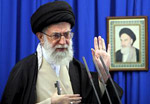 Reuters: Iran’s supreme leader urged voters to turn out in big numbers for a presidential election on Friday, saying such a show of strength would frustrate Tehran’s enemies.
Reuters: Iran’s supreme leader urged voters to turn out in big numbers for a presidential election on Friday, saying such a show of strength would frustrate Tehran’s enemies.
By Yeganeh Torbati
 DUBAI (Reuters) – Iran’s supreme leader urged voters to turn out in big numbers for a presidential election on Friday, saying such a show of strength would frustrate Tehran’s enemies.
DUBAI (Reuters) – Iran’s supreme leader urged voters to turn out in big numbers for a presidential election on Friday, saying such a show of strength would frustrate Tehran’s enemies.
Ayatollah Ali Khamenei was speaking on the last day of a subdued campaign that has not produced a leading candidate from three main hardliners and one moderate.
The winner will replace Mahmoud Ahmadinejad but inherit an economy struggling with high unemployment and inflation, and buckling under the weight of international sanctions imposed over Iran’s disputed nuclear program.
The new president will also have little leeway to change major policies such as Iran’s enrichment of uranium for nuclear fuel or its support for President Bashar al-Assad in the Syrian civil war. Both are decided by Khamenei.
“My insistence on the presence of the majority of people in the elections is because the strong presence of the Iranian nation will disappoint the enemy, make it reduce pressures and follow another path,” Khamenei said in a speech on Wednesday, reported on his web site.
“It is possible that some people, for whatever reason, do not want to support the Islamic Republic establishment but they do want to support their country. They should also come to the polls. Everyone should come to the polls,” Khamenei said.
With 678 people who registered as candidates barred from standing in the election, the United States and the Israel – top of Iran’s list of enemies – have both criticized the ballot as neither free nor fair.
Voters now have six candidates remaining to choose from – a slate dominated by conservatives who tout their loyalty to Khamenei and offer little in the way of real policy differences.
As there are no independent, reliable opinion polls on voting intentions in Iran, it is hard to gauge who will win.
Reformist leaders said the last presidential election in 2009 was rigged to return Ahmadinejad to office and many mainly middle-class, more liberal voters may fail to turn out this time in the belief the same thing could happen. Iranian authorities say all polls are open and democratic.
Moderates and reformists united on Tuesday behind centrist cleric Hassan Rohani, hoping to attract the vote of Iranians hoping for more freedoms and better relations with the West.
IDEOLOGY OR PRAGMATISM?
A high turnout could favor Rohani, but the more liberal Iranians he is most likely to appeal to may be the ones most likely not to vote. However Iranians, analysts say, recognize the difference between bad and worse and may turn out anyway.
“People are not eager to go and vote themselves, but they are worried about who will get elected,” said Zoha, a 28-year-old dental student in Tehran.
“I will vote for Rohani. I will only vote because it might help prevent someone like Jalili getting elected,” she said. “He is a hardliner who will only take away our freedom even more.”
Following some reports of youths wearing Rohani’s purple colors gathering in the streets, his campaign appealed to his followers to respect the law. Riot police cracked down hard on reformist supporters celebrating in the streets believing their candidate had won the 2009 vote.
Rohani’s conservative opponents meanwhile appeared no closer on Wednesday to deciding on a unified candidate.
Saeed Jalili, Iran’s nuclear negotiator has run a strong campaign, but has been heavily criticized, even by fellow hardliners, for his intransigence in talks with world powers and failing to stop the imposition of tough international sanctions.
Jalili is alone among the candidates in defending Iran’s current robust, ideologically driven foreign policy.
“The smallest flexibility in defending our country’s rights will lead to more pressure,” state television quoted Jalili as telling supporters.
Other conservative candidates, while not necessarily disagreeing with the substance of Iran’s present policies, have emphasized what they say will be their more inclusive approach domestically and their more pragmatic style abroad.
Former foreign minister Ali Akbar Velayati said on Wednesday his government would consult widely before taking decisions
“Our problem is that we have gone to extremes and one of my government’s plans is to take a moderate approach,” ISNA quoted him as saying.
The other major hardline hopeful, Mohammad Baqer Qalibaf, has brought in experts to help him run Tehran as the capital’s mayor and largely avoided ideologically motivated unpopular interference in people’s private lives.
But the lack of unity among the conservative “Principlists” could badly split their vote.
“Isn’t the presence of one Principlist candidate with many votes better than the scattering of votes among Principlists?” wrote Hossein Shariatmadari, the editor of influential hardline Kayhan newspaper.
(For an Interactive timeline of Mahmoud Ahmadinejad as president of Iran please click on link.reuters.com/cas68t ))
(Additional reporting by Zahra Hosseinian; Editing by Jon Hemming and Angus MacSwan)


